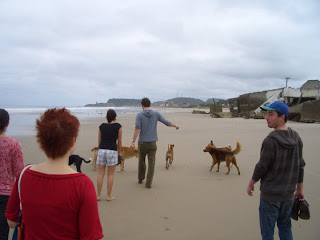The whole business with the coup seems to have blown over pretty quickly, though there is technically still a state of emergency and apparently there are tanks driving around the city. President Correa held firm, until the day after the coup and then made some concessions to the revolting coppers. I now know that the ‘fireworks’ I heard last week were not people celebrating the end of the coup, it was actually the gunfire between the army and the police. A police officer on the side of the state was shot and killed by one of the revolting ones. Loco. One of my students went to work the next day and found a bullet in the wall of their office. The police had little respect here before and virtually none now.
Perhaps this is one reason that there is such a crime problem here in Quito. You can’t really walk around outdoors after dark, and being on the equator, the sun sets at about 6:30pm every day, all year round. If you do venture out there is a very real chance you will held-up at gun point. Some areas are safer, but only relatively so. My apartment block, like most here has 24-hour armed guards. So you are safe while you are home, but you need to take taxis for most journeys, if you can afford it. However, much of the crime here doesn’t involve any actual violence. The murder and serious assault rate is apparently only about one third of that in large cities in the USA. But the petty crime rate is astronomical.
Since the last blog I have started a new job and consequently become of those victims of petty crime here in Quito. Out of the blue I received a call on my mobile on Tuesday AM, asking me to an interview at a university. I had dropped a CV into the reception a few weeks ago, but had heard nothing up until now. They interviewed me Tuesday afternoon and I started on Wednesday, teaching an intensive English course. The university is considered the best in Ecuador by many; certainly it is the most research active. However, it is located outside the city and so I would have to take the Ecovia, the rapid public transit system.
The Ecovia is well known for petty crime, pickpocketing mainly, as it is so crowded. I’ve taken it before and had to keep moving to avoid pickpockets, sometimes other passengers notice them and warn you, sometimes you notice them yourself as they stand just too close to you, and sometimes they get lucky and nobody notices them. On a crowded bus it is impossible to fully protect yourself from pickpockets. There are so many hands and so many people brushing against you, every second of the journey. Any one of them could be your money leaving you.
Knowing how common pickpocketing was and how difficult it is to detect, I took as many precautions as possible when going to work at the university. I kept nothing in my pockets and my work bag was securely around my neck and at my front where I could see it. Still I was targeted as soon as I got on the Ecovia. She stood too close and when I moved she was standing next to me again. She wore business clothes but her left hand was covered in scares, this wasn’t right. I moved again and still somehow she is pressed against me. I kept checking my bag, my pockets; I couldn’t fathom what she was up to. Then the bus stops and she rushes off, followed by the tough guy accomplice, who I hadn’t noticed was with her until now.
With the door open I had room to check myself properly. There was a large gash in one side of my work bag, she had cut it with a scalpel. They had given up and left before taking anything, but in that confusing minute my bag had been badly damaged. Further inspection revealed another small cut in the opposite side of the bag. Presumably her first attempt before I tried to move away from her. At least it was just bag damage, of the six people from my training course who stayed in Ecuador, two have been robbed at gun-point so far.
So what else can I do? I had the bag in my sight and was watching her and still she cut it, twice. Even if I had noticed exactly what she was doing and challenged her, she was six inches away from me and had a scalpel in her hand. This week I’ve obtained two things, the university teaching job I came to find and the realisation that living in Quito is going to be more challenging than I anticipated.
Que será.





























